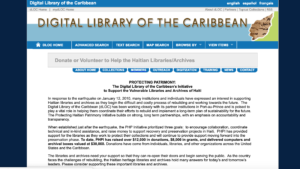

Screenshot of the home page for the Protecting Haitian Patrimony Project at the Digital Library of the Caribbean (http://dloc.com/dloc1/haitianlibhelp)
The Digital Library of the Caribbean’s (dLOC) past projects have included the Protecting Haitian Patrimony Initiative (PHP) (2010) and About Face: Revisiting Jamaica’s First Exhibition in Europe (2012). PHP supports at-risk Haitian libraries and archives in archival recovery and preservation post-earthquake in January 2010. About Face, an online exhibition curated by art historians Petrine Archer and Claudia Hucke presents digitized original content from Face of Jamaica, an art exhibit that toured Europe from 1963-64 and was never brought to Jamaica.
These demonstrate the dLOC’s mission in-practice: to provide researchers “greater access” to digitized Caribbean content materials and advance Caribbean studies through a “cooperative digital project.” Founded in 2002 by nine institutions either in the Caribbean or with prominent Caribbean Studies departments, libraries, and archives, the dLOC now hosts open access to 6,000 titles and 675,000 digitized images from forty-seven partner institutions. Featuring several “topical collections,” materials are organized by format, thematic groups, special collections, and exhibits. The project is powered by SobekCM, a software engine which offers free training and software download.
The dLOC’s outreach efforts include K-12 teacher training and lesson plans, digitization toolkits for all partners and yearly conferences. User-friendly search tools include an interactive map where materials can be found by region and keyword searches. Given these search tools, the project seems primarily intended for researchers both familiar with the Caribbean’s culture, history, and people and some sense of research interests/goals.
All lesson plans, site software, and digitization training at dLOC are freely downloadable to users, perhaps staging dLOC as a model for future collaborative digital projects. dLOC’s cooperative approach and commitment to sustainable digital access and recovery support collections that might otherwise exist in isolation or struggle to obtain funding for digital projects. This isolation is in part due to the Caribbean being understudied in academe, stigmatizations that archipelagoes lack culture/history, and “fragmentation” of Caribbean nations and identities (mirroring that of the internet, as per Kelly Baker Josephs).




At Lisa Rhody’s suggestion, I decided to examine the Colored Conventions Project (CCP) established by Professor Gabrielle Foreman of the University of Delaware with the assistance of two of her graduate students, Jim Casey and Sarah Patterson. The colored conventions were as series of meetings convened by African-American between the years 1830 and 1899 to advance the concerns and advocate for the rights of African-Americans. There were both national and state-wide conventions. They chronologically spanned for the Ante-Bellum period when they could only be held in the northern states to the Post-Bellum period when they were also be held in areas that had been part of the former Confederacy. In fact, immediately after the American Civil War (1865, the number of state-wide conventions skyrocketed, many of them occurring in the Dixie heartland for the first time, which was in no doubt partially fueled by the impetus of Reconstruction. I am really glad that Lisa suggested this database for my blog, as it provides challenges analogous to my current project proposal to examine the limited archives of an American-Irish cultural organization that existed between 1878 and 1995.
The corpus that has come down to us consists primarily of three things: the conventions’ meeting minutes, newspaper advertisements publicizing the meetings, and reports of/from the conventions, which appear primarily in the black press. These conventions are an almost forgotten part of American history, yet in their heyday, such meetings were regularly attended (and addressed) by Frederick Douglass, and the grandfathers of Langston Hughes and W.E.B DuBois. The records that remain narrate a phenomenal ongoing struggle by a vast group of socially and politically disenfranchised people to assert their rights and advance their people towards equality. In particular, the complex and broad social links that developed among the participants and the black press are testament to the persistence and ingenuity involved in developing social networks in the pre-internet age by a marginalized group who often faced bigotry and institutionalized violence.
The site is well organized around an introductory YouTube clip from a local Delaware TV station giving an overview of Foreman, Casey and Patterson and the creation and goals of their endeavor. There is a longer text description of the project which is essentially a series of abstracts from a 2015 symposium with a description of the particular features and challenges of it archival corpus, very effectively interspersed with 3-minute YouTube clips of the authors of the paper abstracts speaking in turn at a roundtable discussion which was part of the 2015 symposium. Some of the specific salient topics raised at the symposium include: the role of black churches (many of these conventions were sponsored by the African Methodist Episcopal Church), the debate over the emigration movement (return to Africa (Liberia)), the role of women in the movement, the focus on the nature and extent of educational opportunity, issues of wealth and class (particularly among the nascent black bourgeoisie and emerging elites).
Two key aspects of the project website that excite and inspire me are the focus on encouraging schoolteachers to incorporate the conventions story and related social issues into school curricula and invitations to interested citizens encouraging them to engage with transcribing the corpus so that it can be utilized as searchable database text. As part of the website, there is a series of short clips of some of the graduate students currently working on the project discussing certain aspects of focus. As you go through these video clips, each graduate student ends with a line that becomes a mantra “Open access is empowerment.”